- Home
- Mark Pryor
The Paris Librarian Page 7
The Paris Librarian Read online
Page 7
“No, no need. I think I’ll find a reason to go back there, see if I can find out a little more myself.”
Lerens said nothing for a moment, then, “Hugo, I don’t understand why. If they’re having an affair, it’s none of your business. I know Paul was your friend, but what will you achieve by confronting his grieving wife about an affair?”
“She’s his long-term girlfriend, not his wife. And I’m not confronting anyone.”
“No, you’re just going to ask really stupid questions about something that’s none of your business . . . questions that make it obvious what you’re thinking.”
“I can be subtle.”
Lerens sighed heavily down the phone. “Explain it to me; tell me what you think you are looking for, what you think you might find.”
“No idea,” Hugo said. “Right now, I’m just trying get rid of that tingling sensation in the back of my neck.”
Hugo reassured Lerens that he had a valid reason to visit Sarah. Two, in fact: the first was to let her know about the autopsy result; the second was to offer assistance with negotiating the French bureaucracy and complex funeral and burial procedures.
“How thoughtful of you.”
“He was a friend, I’d offer that anyway.”
“Just go easy on her, Hugo. Even if she is having an affair, Monsieur Rogers was still basically her husband; she’s going to be devastated. Maybe even more so, with the guilt. Either way, don’t go making things worse.”
“It’s me going, Camille, not Tom.”
Lerens laughed softly. “Good point. All right, I have work to do.”
They hung up, and Hugo started in the direction of Sarah Gregory’s apartment. Ten minutes later, he stood on the steps to the building and rang her bell. He waited a full minute, then rang again. The door buzzed without anyone answering, and he pushed it open, walking quickly across the foyer and up the stairs to her apartment. The door swung open, a pale Sarah Gregory almost leaning on it for support.
“Hugo. Come in. The place is a mess, I’m sorry. I haven’t had the energy.”
He followed her into the living room. “It’s not a mess,” he said. “And even if it were, I certainly wouldn’t care.”
“Sit down.” She didn’t wait for him to do so, sinking into the sofa. Lerens was right, Hugo thought. Whatever else is going on, this woman is most definitely a grieving widow.
“I wanted to let you know, I spoke to the authorities just now.” He knew not to use the word police, it always added anxiety to these situations. “They had to conduct an autopsy, but they confirmed that Paul died of natural causes, a heart attack.”
Sarah Gregory nodded, as if the news was expected, obvious.
“I also wanted to offer my help,” Hugo went on. “Things are always harder when you have to deal with foreign regulations and customs. We have people at the embassy who are trained to assist when an American citizen dies here. That includes dual citizens like Paul.”
“Thank you. I may take you up on that. Our . . . my friend, Alain, has offered to help, too.”
“Good, the more support you have, the better.”
“Michelle Juneau, from the library. She called me this morning, too. Said she went through this recently when her father passed away. She said she’d help, that the people at the library wanted to do something.”
“Good.” Hugo took out a small notebook and wrote down some numbers. “Call any of these and explain who you are. I’ll let folks at the embassy know what happened, give them a heads-up.”
“Thank you.”
“Of course. Is there anything else I can do for you, Sarah?”
“Yes, actually.” Her voice was almost a whisper. “Would you check on Paul’s mother? She’s directly below us. You’ve met her before, right?”
“Yes, a couple of times. Paul brought her to some of the library events.”
Sarah nodded. “She may not remember you, in the last few months her memory has gotten awful. I don’t know if it’s Alzheimer’s or just dementia, but . . . well, I’m not sure she’s even properly accepted Paul’s death.” She sighed. “I’m not sure I have, to be honest.”
“I know, me neither,” Hugo said. “I’ll go see her now.”
“Thanks, I just can’t deal with her right now. We’ve never been close, I don’t know if you know that. That’s made this so much harder.”
“She doesn’t blame you, surely?”
“She can’t, can she? But yes, I think she does anyway.” She stood and gave him a weak smile. “And thank you, really.”
“Of course, anything I can do, just let me know.”
Hugo stood to leave, and Sarah followed him out to the front door. She lingered in the doorway as he went down the front steps.
“Hugo.”
He turned. “Yes?”
She looked at him for a while, her expression unreadable. “Just, thanks. I wanted to say thanks.”
He nodded. “You’re welcome.” He waited, just for a second, in case she had more to say, but with a soft smile she moved back into the entryway and closed the door.
He took the stairs to the ground-floor apartment and knocked on the door. As he waited for an answer, he pictured the robust woman he knew as Paul’s mother. Claire Rogers was her name. Striking even in her seventies, she wore her hair as red as it was when she was younger, and lipstick to match. A smoker until her forties, she had a deep, infectious laugh that she broke out whenever possible. Hugo wondered if her brashness covered the sorrow of losing her first son. She’d clung to her adopted son, Paul, at public functions like he was her lover, not a child. But despite her outgoing personality, she was known to spend hours in her small back garden, a perfectionist who wouldn’t brook any help and wouldn’t let anyone out there unless she accompanied them.
The woman who opened the door shocked Hugo with her appearance. The coiffed red hair had disintegrated into a mess of dirty gray, and, devoid of makeup, she looked every day of seventy. Even her posture seemed to have crumbled.
“Oui, monsieur?” Watery eyes looked up at him, unrecognizing.
“Bonjour, madame. Je m’appelle Hugo Marston. I am a friend of Paul and Sarah. I wanted to come by and express my condolences, see if there’s anything I can do for you.”
Her eyes narrowed as she fought to remember Hugo, but a quick shake of the head denoted failure. She waved a wrinkled hand for him to follow her into the apartment.
“Have we met before?” she asked, lowering herself into an overstuffed armchair.
“We have, but a while ago.” Hugo looked around and picked a chair that would be easy to get up from.
“No one has told me how he died,” she said.
“It was a heart attack, I just found out for certain myself.”
“A heart attack? But he was young.”
“I know, it’s a terrible thing,” Hugo said. “I’m so very sorry for your loss.”
“I don’t have anyone left.”
“You have Sarah, upstairs. I’m sure she’ll take care of you.”
“I didn’t mean that.” There was a hard edge to her voice, as if the Claire Rogers of old was striking back. “I don’t mean her.”
“Your other son,” Hugo ventured. “You mean your first and his girlfriend.”
“Yes.” She was wistful now, and her change in tone took Hugo by surprise. “His girlfriend. We didn’t approve of that girl.”
Just like you don’t approve of Sarah Gregory, Hugo thought.
She sighed and sat back. “I’m next. My doctor said it, or something like it.”
“Surely not, you look fine,” Hugo said. “Do you still work in your garden?”
Her eyes flashed and she started to rise. “You stay out of there, that’s my place. Mine!”
Hugo raised his hands in a calming gesture. “I wasn’t planning to go out there, Madame Rogers, I was just . . . Would you prefer me to leave?”
She sank back into her chair, anger replaced by look of confusion on her face
. “Didn’t you just get here?”
Hugo was surprised by how far she was gone, mentally. He knew it was hard for those close to someone with dementia to recognize the sharp slides in coherence when they happened, but he felt sure she wouldn’t be able to look after herself here much longer. And with her poor relationship with Sarah, it seemed unlikely they’d team up now that Paul was gone.
Hugo stayed for another ten minutes, bringing Madame Rogers a glass of water and listening to her ramble about her family, her sons. She lamented the lack of grandchildren, but at one point raised hopeful eyes to Hugo. “Perhaps it’s not too late, people are having kids later these days. Especially the boys, n’est-ce pas?”
“They are,” Hugo told her. “They certainly are.”
When she walked him to the door, he bent to kiss her cheeks, but she grabbed his hand. “You are a policeman, non?”
“I used to be, in America,” he said.
“I remember that. What day is today?”
“Tuesday.”
“Will you come back tomorrow? Tomorrow evening, because I sleep in the afternoons. At night I don’t sleep so well.”
“Yes, of course.” He groaned inwardly, wondering if she’d even remember the invitation. But he could hardly refuse the old woman. “I’ll be back around six o’clock, when I finish work.”
Hugo set off toward the nearest metro station, École Militaire, trying to turn his mind back to work. But it was the slow season in Paris, and therefore at the embassy, and he had no pressing matters to occupy his thoughts. He looked into the shop windows as he walked, staying in the shade even though the day was cooler than the past week had been. He paused at a small boutique selling old books and realized he’d not collected his copy of In Cold Blood yet. Somehow he didn’t much want it anymore.
He shook his head and started walking again, barely registering the handsome face and athletic figure of Alain Benoît striding in the opposite direction, toward Sarah Gregory’s apartment building. Hugo noticed his passing too late to say anything, only in time just to watch him walk away. And then, in a split-second, Hugo made up his mind.
He set off after the Frenchman, keeping a full thirty yards behind him and ready to duck into a store if the man stopped or turned.
Benoît didn’t. He kept up his determined pace all the way to his destination, where he punched in the front-door code and disappeared inside.
The code that led to the apartment of a grieving woman.
CHAPTER SEVEN
The next morning, Hugo set off early for work. He bought two croissants to eat at his desk and was grateful that his secretary, Emma, was there to make coffee. Like everything else she did, her coffee was brewed with efficiency and to perfection.
“Why are you even here?” she asked when she brought his first cup.
“I could ask you the same question.”
“It doesn’t make sense that we work in a country with so much vacation time, yet we get so little.”
Hugo smiled. “And you think complaining to me will change the vacation policy of the entire State Department.”
“Gotta start somewhere.”
“Then start with the ambassador, he’s got more pull than I do.”
“I did. He said to complain to you.”
Hugo closed his eyes as he inhaled the rich coffee aroma. “If it wasn’t for this nectar, I might give you extra time off regardless of what the State Department says.”
Emma raised a chiding eyebrow and went back to her desk. Half an hour later, Hugo was deleting e-mails and wondering where to eat lunch when his cell-phone rang. It was Merlyn.
“What’re you doing?” she asked.
“Working hard, how about you?”
“I’m going to the Rodin Museum and gardens. Miki’s headed to the library.” She paused. “Actually, she has a favor to ask.”
“Sure, fire away.”
“Here she is.”
Hugo heard the phone change hands, then, “Hi, Hugo, this is Miki.”
“Morning. How can I help?”
“I’m sorry to ask this of you, but Merlyn and I only have about ten days here, which isn’t long for researching a project like this.”
“Go on.”
“Thing is, I don’t mean to sound insensitive or . . . you know. But with Paul Rogers gone, I feel like my access to the Severin papers just closed off.”
“I’m sure someone there will help you, no? Michael Harmuth or Nicole Anisse. Have you talked to them?”
“I went by yesterday afternoon. Harmuth wasn’t there and I get the feeling that Anisse chick doesn’t like me.”
“How about Michelle Juneau?”
“She doesn’t seem to like me, either.” She sighed. “Look, the thing is, it’s more than just the letters and diaries and all that. I know you think it’s silly and maybe there’s not as much to it all as I’d like to think, but I’m absolutely certain there’s a really great story here. And I don’t get why they’re covering it up, keeping it quiet. No one looks bad if it’s true she helped the Resistance. Right?”
“I can’t see a downside if that’s the story, agreed.”
“So I was hoping to get a meeting with Isabelle Severin myself.”
“That sounds like a great idea.”
“Yeah, well, it’s a great idea all right. But I have no clue how to contact her.”
“And that’s where I come in.”
“Merlyn said you might be able to help. She said you could find anyone.”
“With the exception of Jimmy Hoffa and Bigfoot, she’s probably right.”
“Jimmy who?”
“Look, I’ll have to think about it. I know Ms. Severin is an icon, here and at home, so I’ll need to run it by my boss.”
“Thanks, Hugo. How long will that take?”
“I’ll call him right away and get back to you.”
He disconnected and dialed his boss, the former spook and always-affable Ambassador J. Bradford Taylor.
“Hugo, what’s going on?”
“Nothing, a nice quiet summer. Next thing on my schedule is driving you to the airport on Friday.”
“Forget about it, I’ll take the bus. So what can I do for you?”
“I’m calling about Isabelle Severin.”
“What about her?”
“Well, I have a friend who wants to meet her. I’m sure Severin has an agent or personal assistant or something, but I’ve no idea how to get in touch. I also wanted to make sure it was appropriate; I know she’s a national treasure, so I didn’t want to upset anyone by connecting my friend without due process.”
“Is this a social call your friend wants to make?”
Hugo chuckled. “Hardly. It’s a friend of a friend and she’s planning an article or book. She thinks Severin was some kind of spy during the war, wants access to her supposed secret papers.”
“I thought everything went to the American Library.”
“The nonsecret ones did, yes.”
“And do the secret ones even exist?” Taylor asked.
“No idea. That’s what young Ms. Harrison is trying to find out. She wants to go directly to the horse’s mouth, so to speak.”
“So she’s a journalist.”
“Yes, freelance.”
Taylor snorted. “That’s another word for unemployed.”
“Maybe. Which is probably why this is so important to her.”
“I suppose it’d be fine to ask for a meeting, as long as she doesn’t harass Ms. Severin into it. Why don’t you act as go-between?”
“I can do that. Do we have her contact information?”
“Check with Maureen, she should have it.”
Maureen Barcinski was the embassy’s Cultural Affairs attaché, a ball of energy with a memory for names and faces that surpassed any Internet search engine for range, depth, and speed. One of seven kids, she was as good with people as anyone Hugo had ever met, and every Christmas she baked the most delicious chocolate cakes, one for every departmen
t at the embassy, which furthered her popularity. She answered her phone on the second ring, the familiar sing-song voice making Hugo smile.
“Maureen, it’s Hugo. Question for you.”
“Hugo, it’s been too long! You never come to the functions I organize, what’s that about?”
“I never get your invitations, Emma must keep losing them.”
“Emma’s never lost anything in her life, you lying toad. And here you are wanting my help.”
“Very thoughtless, I know. How about I come to the next one?”
“Oh, hush. What can I do for you?”
“Isabelle Severin. How do I get in contact with her? Or her assistant?”
“Oh, I know we have that information somewhere. We used to see or hear from her several times a year, but I don’t think she’s been in touch for quite some time. A year or two at least. Can I call you right back?”
“Sure, thanks.”
Hugo stared at his computer as he waited, looking up when Emma let herself into his office with more coffee. She frowned at the croissant crumbs on his desk but didn’t offer to clean them up. Not her bailiwick, as Hugo well knew. When she’d gone, he gazed out of the window, fighting the urge to research someone in particular, but halfway through his coffee his eye fell on a book by Oscar Wilde. He took it as a sign.
He smiled to himself as he quoted the famous writer: “The only way to get rid of temptation is to yield to it.” He leaned forward and typed the name Alain Benoît into the computer, coming up with nearly five thousand results. He clicked on the Images button to see if he could spot his man, find out which Alain Benoît he was. He scrolled through several pages of results and then saw him, that distinctive handsome face. He was pictured with a Tour de France stage winner, each holding a glass of champagne and smiling. The caption to the photo indicated that Benoît was a journalist.
Another one, Hugo thought. He added journalist to his search terms and came up with several articles the man had written, but very little personal information. Hugo read between the lines as best he could and put his feet on his desk to think. From what he’d seen, Benoît had tried early in his career to write more serious articles, then moved into sports. A change of interest, or maybe an opportunist who goes where the money is?

 The Book Artist
The Book Artist The French Widow
The French Widow Hugo Marston 04 - The Reluctant Matador
Hugo Marston 04 - The Reluctant Matador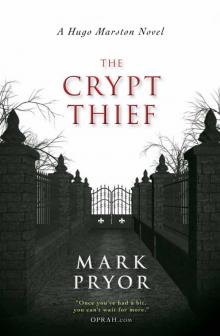 The Crypt Thief
The Crypt Thief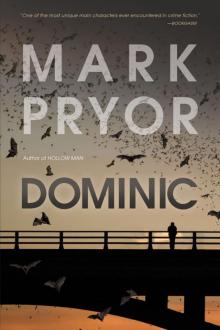 Dominic
Dominic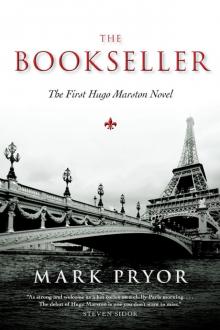 The Bookseller
The Bookseller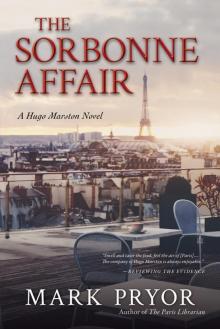 The Sorbonne Affair
The Sorbonne Affair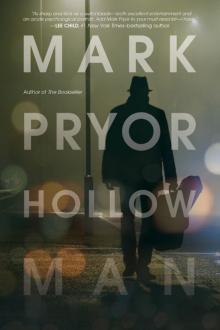 Hollow Man
Hollow Man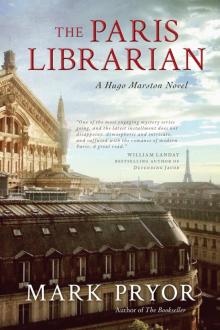 The Paris Librarian
The Paris Librarian